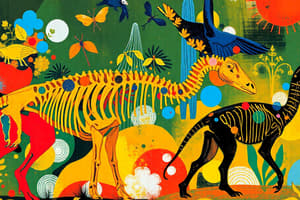Podcast
Questions and Answers
What is a trace fossil?
What is a trace fossil?
What is an isotope?
What is an isotope?
What is a cast in terms of fossils?
What is a cast in terms of fossils?
What does evolution refer to?
What does evolution refer to?
Signup and view all the answers
What are the functions of the digestive system?
What are the functions of the digestive system?
Signup and view all the answers
What are the roles of the mouth in the digestive system?
What are the roles of the mouth in the digestive system?
Signup and view all the answers
What is peristalsis and where does it occur?
What is peristalsis and where does it occur?
Signup and view all the answers
Where does most of the chemical digestion take place in the digestive system?
Where does most of the chemical digestion take place in the digestive system?
Signup and view all the answers
What is the role of the large intestine or colon in the digestive system?
What is the role of the large intestine or colon in the digestive system?
Signup and view all the answers
Study Notes
Digestive System Functions
- Breaks down food into molecules the body can use
- Absorbs molecules into the blood and carries them throughout the body via the circulatory system
- Eliminates wastes from the body via the excretory system
Roles of Organs in the Digestive System
Mouth
- Mechanical digestion: physically breaks down food using teeth
- Chemical digestion: breaks down food molecules using saliva
Esophagus
- Muscular tube connecting the mouth to the stomach
- Peristalsis (muscle contraction) moves food through the esophagus
Stomach
- Most mechanical digestion takes place
- Some chemical digestion occurs with the help of digestive juices (enzymes and acids)
Small Intestine
- Most chemical digestion takes place
- Absorbs nutrients from digested food into the bloodstream
Large Intestine (Colon)
- Water is absorbed into the bloodstream
- Remaining material is prepared for elimination from the body
Rectum
- Waste material is collected prior to elimination from the body
Studying That Suits You
Use AI to generate personalized quizzes and flashcards to suit your learning preferences.
Description
Test your knowledge of key concepts in paleontology and evolutionary biology with this quiz. Match the definitions to the corresponding terms like fossil, evolution, isotopes, scale, and extinctions.




